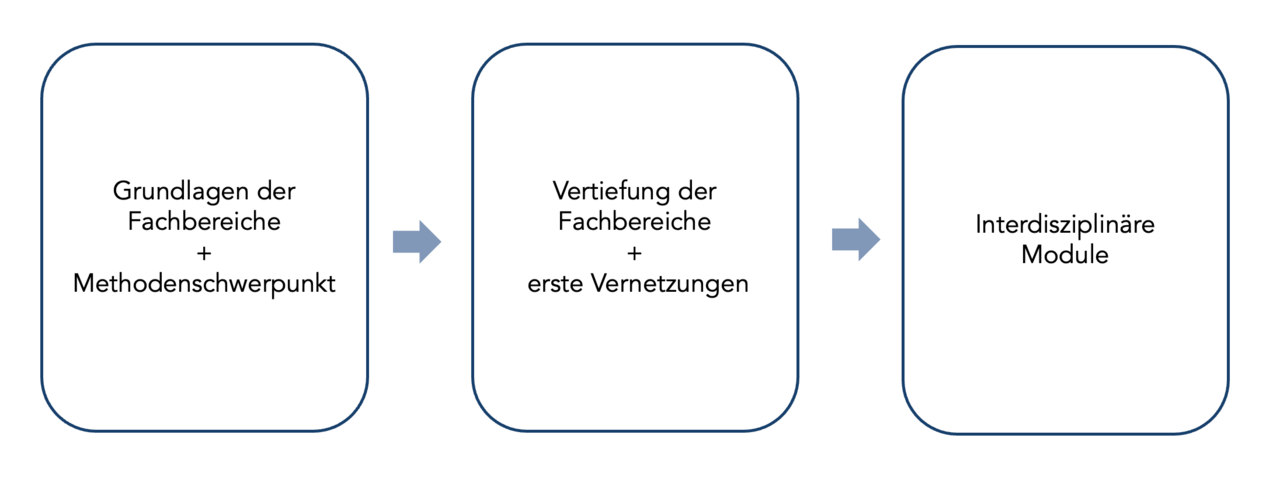Course of study

The BA program Philosophy, Politics and Economics is divided into two phases:
In the first two years of study, students learn the basic concepts and methods of the three participating subjects: philosophy, political science, and economics. In-depth knowledge from the field of philosophy is acquired in practical and theoretical philosophy, logic, political philosophy, and economic philosophy. From the field of political science students acquire knowledge of political systems, for economics the basics of economics and economic policy. Depending on the focus, different methodological modules are studied: These include survey and analysis methods (political science) or statistics I, statistics II, and econometrics (economics).
In the third year of study, the acquired knowledge and methods are brought together and deepened within the framework of interdisciplinary modules. The practical testing of the acquired skills takes place within the framework of an internship. Finally, the bachelor’s thesis provides evidence of the acquired competences on the content and methodological level.
This more detailed image also shows the individual modules:
Examples of courses in past semesters:
In addition to the recurring courses - such as introductory lectures - there are changing courses in various formats each semester. Seminars in particular can be tailored to current events. To give you an impression of the diversity of the content of the courses, the table below lists examples of courses held in previous semesters for different modules.
Philosophy:
| Practical Philosophy | Introduction to Ethics; Scientific Working Techniques |
| Theoretical Philosophy | Epistemology; Metaphysics; Theory & Practice of Argumentation |
| Political Philosophy | Introduction to political philosophy; political authority; philosophical perspectives on the Corona pandemic; Immanuel Kant: On Perpetual Peace |
Philosophy of Economics | Moral limits of the market; allocation ethics; deontology; cultural evolution; Hugo Grotius' property theory |
Political Science
| Basic Module Political Science | Introduction to the German Political System; Democracies in Comparison; Introduction to Political Theory |
| Advanced Module Political Science | Political Science Parties in Modern Democracies; The Political System and the Political Culture of the US; Parliaments; Emotions in Politics; The Democratic Deficit of the EU; Democratic Innovations; Outlines of German Foreign Policy; International Climate Protection Policy; Representation in the European Union; International Political Economy; The Populist Radical Right in Western Europe; Current Challenges of Economic Policy |
Economics
| VWL I | Introduction to VWL; Markets and Prices |
VWL II (Macroeconomics) | Income, employment and price levels |
VWL III (Economic Policy) | Fundamentals of economic policy; introduction to game theory
|
Interdisciplinary Modules
| Individual and collective Decisions | |
| Climate Crisis; Campaigning by International Non-Governmental Organizations; Tax Evasion in Western Societies: Social Norms, Consequences, and Government Responses; Meaning and Purpose of Philanthropy; Economics of Football; Consequentialism; European Environmental Policy; Selected Aspects of Trust Goods Markets | |
| Organization and Structure | Acting Rationally; Introduction to Comparative Welfare State Studies; Behavioral Game Theory; Public Finance; Institutional Economics; HHU Becoming More Sustainable! Students develop interdisciplinary concepts for sustainable development; energy transition and sustainability. |
| International Relations and European Integration | Global Justice; Global Governance; Globalization - Criticism, Defense and Challenges; On Globalization and Innovation; Migration - Ethical and Sociological Aspects; Philosophy of International Politics; European Security Policy; Political Culture in International Comparison; Monetary Theory and Policy |
| Leadership and Processes | The Semantics, Metaphysics and Politics of Race; Election Campaigns & Campaigning: The 2021 Federal Election; Theory and Practice of Economic Systems; Which Citizens Does Democracy Need?; Feminist Political Philosophy; The Personalization of Politics; Elections & Voting Behavior |

